Let Constitution be in the mother tongue as well

This file photo shows a signboard pinned on a tree at Sangach Primary School in Marakwet East Consistency discouraging pupils from speaking in their mother tongue at the school.
The framers of the Constitution made the mistake of assuming that participatory constitution-making processes would allow them to canvass the views of common citizens, resulting in a greater understanding of its meaning and impact on their lives.
Most ordinary citizens, particularly at the two demographic poles — the young and the elderly — suffer from pervasive constitutional illiteracy. The ignorance, exacerbated by inaccessibility to fundamental constitutional knowledge, can significantly jeopardise the nation’s constitutional principles.
Most can competently recite a Bible verse or chapter and some even quote a verse verbatim, but the chances of finding a copy of the Constitution in a home are slim.
Unlike religion, which has become almost natural, the Constitution is seen as arcane, something for the lawyers and politicians. Some have grown frustrated by the differing legal opinions. Others feel daunted by constitutionalism, writing it off as too verbose and complex.
European language
Language is a crucial constitutional issue in a country with a diverse linguistic population, and where language cleavages correspond to political divides. The totalitarian use of English — constitutionally recognised as the only official language — in constitutional drafting and legal decisions has resulted in “language poverty”, exacerbating constitutional illiteracy, particularly among monolingual mother-tongue speakers and those not fluent in the European language.
We must all strive to be constitutionally literate. Building a participatory constitutional democracy that is based on the people’s will is a long-term project. And adoption and implementation don’t automatically result in understanding and awareness of a constitution’s content and workings.
Such knowledge does not come naturally through the regular educational system. It must be accomplished efficiently, including the translation of the Constitution into the local languages.
Mr Onyango is a Global Impact Fellow at Moving Worlds Institute. [email protected].





